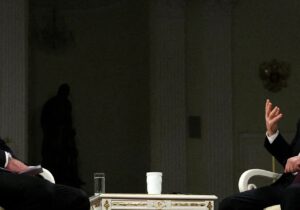Back in 2004, the late Charles Krauthammer (1950-2018) authored “Democratic Realism,” a classic of foreign-policy thought. As the name suggests, Krauthammer’s democratic realism is akin to the Christian realism which animates Providence. Christian realism, as Daniel Strand puts it, “keeps the tension between the already and the not-yet that we are so prone, in our pride, to dismiss.” Both Krauthammer’s democratic realism and Christian realism are tempered by sober acknowledgement of the reality of power politics while also refusing to be exclusively defined by realpolitik.
In “Democratic Realism,” Krauthammer criticizes what he terms “liberal internationalism,” the Clinton administration’s foreign-policy philosophy. To liberal internationalists like Clinton, foreign policy must serve idealistic, selfless goals, such as “humanitarian interventionism,” and force is to be used only in service to such aims and never in pursuit of self-interest. Against this folly, Krauthammer’s “democratic realism” stands as an approach which is idealistic to some degree, but also unapologetically pursues the American national interest and focuses on acting where it counts most: “We will support democracy everywhere, but we will commit blood and treasure only in places where there is a strategic necessity.”
Twenty years later, we can ask how accurate the late pundit’s criticisms were. One example of the failure of liberal internationalism was the support of politicians like then Senator Joe Biden for the “unenforceable” Chemical Weapons Convention (CWC) in the early 90s on the grounds that it codified, in Biden’s words, “the moral suasion of the entire international community.” As Krauthammer noted, “moral suasion” would be ineffective against the very rogue states the CWC was supposed to deal with. Since 2004, this objection has only been vindicated. Despite Syria being a State Party to the Convention, Bashar al-Assad repeatedly used chemical weapons. When, in 2017, the United States finally penalized this practice with airstrikes, John Bolton declared that “[t]he Obama era in American foreign policy [had] ended in Syria.”
The CWC’s inability to prevent the use of chemical weapons in Syria is one example of the myopic idealism that has long beset Biden’s foreign policy. Some, like Senior Fellow at the Yorktown Institute Shay Khatiri,, have mistakenly argued that the Biden Administration marks a shift away from the “dovish” foreign policy of “the Obama-Trump era” back to “neoconservative principles.” Instead, as former general and Trump Administration official Keith Kellogg has highlighted, “Biden’s own Supreme Allied Commander in Europe assessed that Biden’s botched withdrawal from Afghanistan led to Putin’s decision to re-attack Ukraine.”
The widespread notion of Trump’s dovishness and Biden’s hawkishness proves that rhetoric can be more persuasive than reality. As Khatiri mentioned, “many of those often labeled as neoconservatives [had] endorsed and voted for Biden,” partly because of “his promise to restore America’s standing in the world.” Rhetorically, this view seemed to be borne out; soon after his election, Biden hastened to declare: “America is back.”
However, in practice, America’s return to world affairs has entailed a renewed commitment to the “conventions, protocols, legalisms” which, in Krauthammer’s memorable image, bound the world’s hegemon like Gulliver in Gulliver’s Travels. The White House extended the unhelpful New Start nuclear arms control treaty with Russia, only for Moscow to pull out two years later. The White House struggled unsuccessfully to revitalize the Joint Comprehensive Plan of Action (JCPOA) deal with Iran. Getting back into the Paris Agreement was also high on the list of priorities.
Another takeaway from revisiting Krauthammer’s analysis is that those in the liberal internationalist camp have only become more radical over the past two decades. For Krauthammer, the Clinton administration demonstrated that liberal internationalists were not opposed to deploying military power, only that they were insufficiently concerned with the “national interest” as opposed to idealism. But has Biden’s response to Russia’s invasion of Ukraine been ultimately more aggressively hawkish or dovish? The fact that weapons deliveries have seemed calibrated to achieve only the bare minimum of preventing Ukraine’s outright defeat rather than securing victory indicates that Biden is not doing all he can to expand American influence around the world, but rather as little as possible to prevent its further rollback.
Biden’s missteps with Ukraine and Afghanistan are only part of a much larger sequence of blunders, in which the surrender of Afghanistan to the Taliban is quickly followed by the lifting of sanctions on Cuba and the simple rhetorical failure to define what Ukrainian victory means for America. US policy on Iran provides another example: the Biden Administration removes the Iran-backed Houthis from its list of Foreign Terrorist Organizations and seeks to revive the JCPOA, then Tehran attacks Israel through its proxies on October 7th. Washington lifts sanctions on Tehran worth $10 billion and distances itself from Israeli airstrikes in Syria against Iran’s IRGC. Tehran then attacks Israel directly, in a “massive and unprecedented” operation using “over 300 projectiles,” only for Washington to discourage Israel from retaliating.
These patterns represent successive displays of weakness, each inviting further aggression from America’s enemies. Alternatively, we can conceptualize all this as a move away from unipolarity in the international system. Krauthammer had little doubt that, in its role as unipolar hegemon, America was an agent of security: “In the unipolar world, the closest thing to a centralized authority, to an enforcer of norms, is America—American power.”
In an influential 1999 article, Dartmouth’s William C. Wohlforth argued that unipolarity in the post-Cold War period provided greater stability than either bipolarity or multipolarity. Wohlforth’s assessment included factors which Krauthammer did not even mention, such as the fact that the preponderance of US power eliminated “hegemonic rivalry over leadership of the international system.”
Such assessments are only further substantiated by the rise of conflict worldwide in response to diminishing US power projection. In 2018, former Department of Defense official Seth Cropsey has even argued that the concept of polarity has lost relevance altogether as Europe and the United States are not behaving as leading powers should. Instead of maximizing their influence on the world stage, they have turned inward, a trend which is accelerating.
A voluntary retreat of this kind is probably the main challenge to American hegemony; the US has the power to exert influence globally, but perhaps not the desire. Wohlforth’s and Stephen G. Brooks’s 2016 commentary “The Once and Future Superpower” remains compelling in its demonstration that, for the foreseeable future, the United States is objectively in a league of its own. Moreover, Krauthammer noted that the United States was historically unique in terms of its geographical location, shielded as it was “by two great oceans” and surrounded by amicable countries to the north and south. Granted, even these advantages have been eroded through the admission of narcotics via an open border. Still, as Krauthammer stated on another occasion, “Decline Is a Choice.”
Krauthammer’s insights remain as pertinent today as in 2004. Then and now, liberal internationalism, as opposed to democratic realism, represents a misguided attempt to form an international system defined entirely by American values. Furthermore, while Krauthammer distinguished between realists and isolationists, these two schools of thought have become well-nigh indistinguishable. Given that the realist-isolationist synthesis presents itself as the alternative to liberal internationalism and its unpopular fruits, a philosophy such as democratic realism or Christian realism must be championed instead.
In the face of aggression, Krauthammer wrote, victory is had by not only by “taking territory,” but also “leaving something behind” which will preclude further conflicts. In 2004 that, “something” referred to democracy in Iraq and Afghanistan. In the future, it could refer to security guarantees – real ones – for Ukraine, or the “Cyrus Accords,” or simply improved defenses for Taiwan. As the calamities of the last few years have showcased, a change in one region often has profound effects on the whole international system. Clearly, threats to American influence anywhere are threats to American interests everywhere and must be responded to as such.





